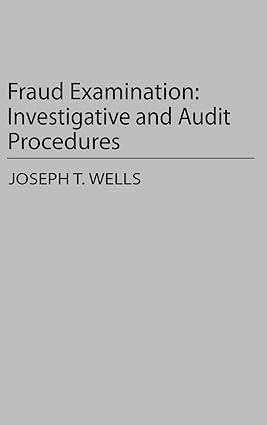Question
1. Analytical procedures involve identifying fluctuations in accounts. For example, if an auditor is aware that the client has issued a significant amount of equity
1. Analytical procedures involve identifying fluctuations in accounts. For example, if an auditor is aware that the client has issued a significant amount of equity in the previous financial year, the auditor would expect the debt to equity ratio to
increase.
double.
decrease.
remain unchanged.
2. Which of the following would most likely be the most appropriate basis for determining materiality in a publicly listed enterprise?
net income before tax
total assets
total liabilities
total equity
3. Which of the following is true when the auditor determines the client has a low risk of material misstatement? Select all that apply.
detection risk is assessed as high
inherent risk is assessed as low
very limited testing of controls will be performed
control risk is assessed as low
reduced reliance on substantive tests of transactions and account balances
4. An auditor determines that a client does not have appropriate controls in place to mitigate the risk of material misstatement. The auditor will do all of the following EXCEPT
make recommendations to improve controls.
report identified weaknesses to those charged with governance.
adopt a combined audit approach.
increase the reliance placed on detailed substantive procedures.
5. A client engages in numerous foreign exchange transactions and the auditor considers that there is a risk these transactions are incorrectly stated. During the assessment, the auditor also determines that the internal controls in place help mitigate the possibility that transactions are valued incorrectly. How will the auditor assess inherent and control risk?
inherent risk as high and control risk as low
inherent risk as low and control risk as high
inherent risk as high and control risk as high
inherent risk as low and control risk as low
6. Which of the following information sources would generally be considered reliable?
information generated by an independent reputable external source
information generated by an accounting system with ineffective internal controls
unaudited information
information generated using inconsistent accounting methods
7. If an auditor determines that a control exists to mitigate the risk of material misstatement, the auditor will
immediately decide to rely on the control.
increase their reliance on detailed substantive procedures.
choose a substantive audit strategy.
test the control and determine if it is effective.
8. Which of the following does the auditor NOT consider when assessing the inherent risk of an entity?
previous experience with the client
nature of the business
entity's internal controls
type of industry
9. Audit risk will be set lower for a company
with a significant going concern issue.
with few financial statement users.
with ineffective internal controls.
where management is known for its integrity.
10. Which of the following would be considered a non-recurring item that may need to be normalized when determining materiality? Select all that apply.
unusual gains or losses
interest expense on loan repayments
management bonuses
discontinued operations
management salaries
Step by Step Solution
There are 3 Steps involved in it
Step: 1

Get Instant Access to Expert-Tailored Solutions
See step-by-step solutions with expert insights and AI powered tools for academic success
Step: 2

Step: 3

Ace Your Homework with AI
Get the answers you need in no time with our AI-driven, step-by-step assistance
Get Started


